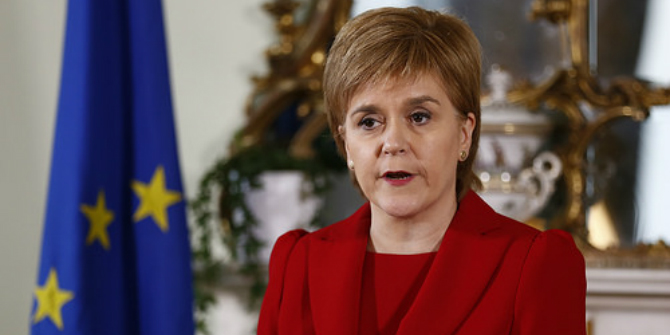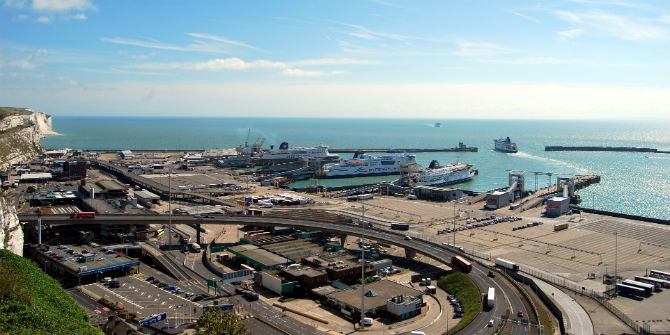 Yesterday, Nicola Sturgeon unveiled her government’s well-trailed, long-awaited Brexit paper. The 62-page paper sets out two options. The Scottish Government’s preferred outcome is for the UK to participate fully in the European single market and to remain within the EU’s customs union. Daniel Kenealy argues that these plans may be politically savvy, but are all-but-impossible.
Yesterday, Nicola Sturgeon unveiled her government’s well-trailed, long-awaited Brexit paper. The 62-page paper sets out two options. The Scottish Government’s preferred outcome is for the UK to participate fully in the European single market and to remain within the EU’s customs union. Daniel Kenealy argues that these plans may be politically savvy, but are all-but-impossible.
Sturgeon proposes that the UK joins the European Economic Area (EEA) Agreement, by way of membership of the European Free Trade Association (EFTA). This would be the softest Brexit imaginable. Failing that, the paper calls for Scotland “to remain within the EEA and the European Single Market” (para. 107). How, you ask? The UK Government would make it clear, upon triggering Article 50, that it is seeking a differentiated settlement for Scotland. That settlement would likely involve the UK sponsoring a bid for some form of Scottish membership of EFTA, after which Scotland would seek to become party to the EEA Agreement, thus securing full participation in the single market. The final piece of the puzzle, in order for Scotland to participate fully in that market, would be a new devolution settlement that would see wide-ranging powers transferred to the Scottish Parliament. This would, says Nicola Sturgeon, come closest to respecting the wishes of the Scottish people who voted, by 62% to 38%, to remain in the EU whilst also respecting the result, across the UK as a whole, to leave.
The document is certainly an exercise in creative thinking. It would be wrong to categorically label the proposal for Scotland to join the EEA via EFTA, whilst remaining part of a UK that is neither a member of EFTA nor a party to the EEA, as impossible. It will be my previous sentence, and sentences like it, that SNP politicians trot out in the weeks and months ahead. But the proposal is all-but-impossible and the legal, political, and technical barriers standing in the way of it are high, and almost certainly insurmountable. It is telling that Charles Grant – a member of Nicola Sturgeon’s Standing Council on Europe and a man who understands Brussels as well as anyone – labelled it “very hard to make work”.
This article is not the place to explore all of the problems with the proposal, but let me identify just a few. First, membership of EFTA is open to ‘any State’ (Article 56). Scotland is not a state and thus the EFTA Treaty would have to be amended. Beyond that, a sub-state entity like Scotland becoming a party to the EEA Agreement would require the approval of 27 EU member states and the current 3 EEA-EFTA states. Many of these states will be rightly cautious about the precedent set, given their own secessionist movements (Spain had already poured cold water on the Scottish Government proposal).
Furthermore, although the Scottish Government identifies examples of differentiated solutions within the current EEA arrangements they are poor comparators. The paper rightly makes the point that “Denmark is a [EU] member state, but parts of its territory – Greenland and the Faroe Islands – are currently outside the EU and the EEA” (para. 108). The paper references the Faroe Islands example repeatedly and indeed the Faroe Islands have been seeking EFTA membership with Denmark as their sponsor, although that is making slow progress. But to claim that Scotland can be considered similar to the Faroe Islands is akin to claiming that the UK can be considered similar to the Channel Islands. To use arrangements made to accommodate tiny overseas territories as an example for a country of 5.3 million people, possessing major population centres and a diversified economy, is stretching the sinews of credibility.
Finally, in order for Scotland to meet the obligations of EEA-EFTA membership, almost all areas of policy would have to be devolved – immigration, business regulations, employment law, competition policy, product standards to name just a few. This would not be a revision of the devolution settlement; it would be accomplishment of de facto independence via a murky and technical back door.
If the policy is all-but-impossible, the proposal is politically savvy
If the policy proposal is all-but-impossible, why has the Scottish Government gone to the trouble of publishing it? One word: politics. The proposal is politically savvy in at least three ways. First, it allows the SNP to play on the politics of difference, which has proven a highly effective strategy for them. It reminds everybody of the differential referendum result in Scotland, as opposed to the UK as a whole, and the need for distinctive Scottish values and interests to be promoted. It does this not only vis-à-vis the EU but also more broadly as regards immigration, with Nicola Sturgeon able to take a stand in favour of free movement in contrast to the UK Government.
Second, it allows SNP officials to engage in para-diplomacy (where sub-national entities engaging in international relations). Whilst forms of economic and cultural para-diplomacy are fairly common, political para-diplomacy is less common and tends to be employed by sub-national governments seeking greater autonomy or independence. It involves seeking recognition and legitimacy internationally as something more than a region. When local leaders are seen in international contexts, negotiating and battling for the interests of their territory, this can operate as a form of nation building. It is something that the SNP have attempted to do since coming to power in 2007. Brexit, and the pursuit of a differentiated deal for Scotland, have allowed for this type of activity.
Third, it taps into the argument that the UK Government and/or Westminster do not defend Scotland’s interests. My friend Stuart MacLennan – with whom I’ve published on the Scotland-EU relationship – pithily and accurately sums it up: “From a nationalist perspective, it makes good practical sense to march supporters to the top of the EEA hill, only for big, bad Westminster to march them back down again. But for the Scottish Government to present itself as pursuing a policy it must surely know has no chance of success is fundamentally dishonest”. I agree. It is dishonest. And the paper is shallow in terms of policy: many pages are taken up by a rehashing of the importance of the Scotland-EU relationship and when examples are used they are questionable ones.
The question now is what happens next? Theresa May yesterday played down the idea of a differentiated settlement. But the ball remains in her court. In the New Year attention will focus on the details of the deal that the UK Government will seek to make with the EU. And in March we are told Article 50 will be triggered. If Nicola Sturgeon’s proposals are largely shunned by the UK Government – as they almost certainly will be – then the ball will be back in her court. Alex Salmond has recently and boldly asserted that he thinks the SNP would score a victory in a second independence referendum. And Sturgeon, in her foreword to yesterday’s paper, maintained a second independence referendum as an option (p. viii). Given the current state of public opinion , this may well be bluff and bluster. At the very least a rejection of these proposals by Theresa May could set the stage for another showdown between the Scottish and UK Governments, this time over the politics of a second independence referendum.
This post represents the views of the author and not those of the Brexit blog, nor the LSE. Image source.
Daniel Kenealy is Lecturer at the University of Edinburgh where he teaches and researches devolution and EU politics. He is the co-editor of The European Union: How Does it Work? (Oxford University Press, 2015), has published on Scotland’s relationship with the EU, and was expert adviser to the Scottish Parliament’s EU Committee during 2013-14.








Its a nonsense and Sturgeon knows it is. It is all about Sturgeon angling for a second referendum on independence. Whether Sturgeon and the SNP like it or not, the referendum on our membership of the EU was a UK wide one and Scotland is a part of the UK and should, like the rest of the UK, abide by the outcome.
I wouldn’t entirely rule out a change of heart in the UK on staying in the single market as the economic effects hit the man in the street. In particular, it does appear that Nissan have been promised things that certainly seem to require single market membership.
However, on balance I suspect that a second independence referendum is the more likely outcome. The polling for a Yes vote is higher than the polling for Leave was in the Brexit referendum.
We also have the matter that the No campaign would probably be led by Ruth Davidson. Impressive though she is, I think it would be tricky for a Conservative to win a poll in Scotland. We also have the fact that business is now much more split which was another important factor last time. Finally, even among No voters I’ve spoken to there is very little passion for the Union. At a business dinner someone said to me that they were ashamed and embarrassed to be British but the economic case against independence was too strong.
I’m not comfortable on calling it one way or another but my gut feel is that a Yes vote would be the more likely outcome.
What planet are you on, you are obviously one of the blinkered yes voters who lives in a land of nod, and cannot accept that this current Government has run our country into the ground with there mismanagement of NHS, Transport Police to name a few. the problem is prior to last year they had a majority so they could pass what they wanted, with n outside scrutiny now they have to declare the details they have been shown up for the liars they are, unlike the Tories who are transparent in their views the SNP have covered them up and ruined our economy, all in the name of Independence which is their one and only goal with no thought for anyone who does not want to be dragged into their cauldron.
I voted No, donated thousands of pounds to Better Together and wrote a series of articles in the FT on why Scotland should remain part of the UK. But I’m not a blinkered No voter.
Thank you for this fair analysis. For me it underlines yet again the depressing binary state of Scottish politics, where the Scottish Government led by NS is unable to move on beyond its infantile response to losing the 2014 referendum. Our first minister and her colleagues had an opportunity to show visionary, thoughtful leadership for Scotland within the UK after Brexit. They have wasted this opportunity because they only view the future through the prism of separation from the rest of the UK.
Seems to me Eric you haven’t really engaged with what the SG plan is actually saying. It’s all very well being ideologically opposed to the current SG, but their plan (whatever its imperfections) DOES exemplify their vision for Scotland within the UK after brexit. I understand you don’t see it as visionary, but I (and I suspect very many other Scots amongst the 62% who voted Remain, even some who don’t necessarily support independence) DO regard it as a positive contribution, and yes even perhaps as visionary.
Remember, this plan is setting down the SG’s wish list of what it wants, and what it feels Westminster has to deliver, to AVOID calling #indyref2. It seems more than a tad odd to criticise them for presenting a plan for keeping Scotland within the UK, and hardly fits with your description of them as not moving on, infantile and seeing everything thru’ the prism of separation.
Your language, and obvious animus against the SNP and independence appear to exhibit rather than disprove the very binary state of Scottish politics you find so depressing. As Dan notes below, the increase in support for Scottish independence prior to 2014 ought to tell “thinking” unionists something. The second indyref is by no means assured, nor is the outcome certain, but starting from a 45% starting point with the prospect of 2 years of uncertainty is certainly a better starting point than we had in 2012.
Many perfectly sensible people who came relatively late to supporting Scottish independence (and even SNP membership) would have settled for the kind of federal solution being proposed in the SG’s plan; isn’t the more pressing question why the unionist establishment in both Scotland and England have so signally failed to engage, failed to produce a plan and failed to explain why a differential brexit is achievable?
In politics one thing that you can’t put a price on is political instinct. Although I’m not an SNP-supporter – as you may have noticed – Nicola Sturgeon certainly possesses that! And yes, quite right, a better starting point in sheer numbers than in 2012.
Thank you for your reply, Andy.
You say I haven’t “engaged with” the SG plan. I am not quite sure what you mean by that statement. I have read and considered the plan, and I have come to a view, not far from that expressed by Daniel Kenealy in his post i.e. “impossible but politically savvy”.
You also say I have “animus” towards the SNP. I certainly disagree with some, but not all, of their policies (my work involves helping to implement one of them!). However, they are a nationalist party whose aim of separating Scotland from the rest of the UK is one I cannot support, partly on economic grounds, but largely from having, seen at first hand the divisions and bitterness caused by nationalism elsewhere – despite the good intentions of some of its adherents.
In the EU referendum I voted to remain. I’m disappointed in the result, but it was a UK vote. I’m a UK citizen, living in a democracy, so I expect the governments – UK and Scottish – to work in partnership to achieve the best outcome for Britain. I accept that Sturgeon’s Brexit strategy tries to put a superficial gloss of partnership on her proposals. But, as you know as well as I do, in Nicola Sturgeon’s world, independence trumps everything else – that aim is in clause 1 of the SNP’s constitution. And that’s where her Brexit policy leads.
Andrew,
I agree I wouldn’t rule out the possibility of the UK opting to try and remain a full participant in the single market via the EFTA/EEA route (I find it hard to put probabilities on these things but I’d say there’s at least a 5% chance if things go south in the New Year and EU negotiating partners dig in.
I think you’re spot on in your comments on a second indyref. This is mostly about laying ground work for that, through a continuing emphasis on the politics of difference. The Scottish Government proposal is set up NOT to be delivered and the blame will be placed at the door of the UK Government, thus the argument will be Scotland must break away to defend its distinct set of interests.
What I wouldn’t even try to predict, then, is the outcome of the referendum. The ‘Yes’ campaign moved mountains – in public attitudes terms – through the last campaign, solidifying that 45% percent support from a far lower base at the outset of the campaign. But I have also heard from various people that the nightmare scenario for the SNP is a re-run of the campaign in the midst of Brexit uncertainty. Uncertainty about independence itself was problematic for the ‘Yes’ campaign last time. This would be uncertainty squared!
Dan
My view is that the SNP lost the referendum last time mainly due to economics. I remember an interview in the FT with a farmer saying “My heart says Yes my head says No” which I think was quite a widely held view among swing voters.
Also the SNP position was worsened by their truly ludicrous policy on the currency with a “have our cake and eat it” approach to the pound. As I recall even the CEO of the Yes campaign struggled to defend it.
However with Brexit I think the economic picture is much less black and white. We have 2-3 million jobs in the UK which will need to be relocated into the single market, a tiny fraction of these would be enough to give an independent Scotland a great start. Indeed there are probably more EU dependent jobs in England than there are in the entire Scottish workforce.
I also think that the lesson on the currency has been learnt and the SNP would present a more realistic policy.
Finally, the timing of the referendum is in the hands of the Scottish Government so they can choose the optimal moment. Perhaps as some of 80,000 Brexit redundancies hit Scotland?
It’s trite to simply dismiss the Scottish government’s proposals as purposefully impossible to achieve, or as Karl blithely dismisses them “nonsense”. Difficult to achieve…? Yes. Without precedent..? Of course, as there is no precedent of a member state leaving, and part of that member state trying to negotiate a differential settlement. Impossible…? No, not if Westminster is actually sincere about delivering a solution which is best for ALL parts of the UK, and which shows that it has taken the wishes of Scottish and Northern Irish Remain voters into account.
The plan is of course imperfect, but at least it represents the bones of a deal. It is instructive that the reactions from many within the EU have been positive, and that even some of the more reasonable Scottish unionists have found little to disagree with.
Of course Sturgeon, the SNP and supporters of the Yes movement want independence. 62% of Scots also voted Remain. It’s easy to label this “the politics of difference”, but the fact is it reflects the very real differences that now exist. It is no longer good enough for the UK government to insist that a “one size fits all” policy is sufficient, particularly when a majority of Scots is no longer prepared to tolerate their interests being given short shrift and either ignored altogether, or given only superficial analysis. Diverging priorities and distinct needs demand a new approach; a government which refuses to compromise and delivers a mutually agreed position is courting a constitutional crisis. No more Vows, no more tinkering; deliver the ability to achieve a differential outcome by devolving ALL the powers necessary (even if it does mean “Real Home Rule” with nothing off the table) or stop wasting our time and get ready for #indyref2.
The need for para-diplomacy has never been greater, so it is unsurprising that given recent events the SG should prioritise it. Arguably they have been behind the curve of their Catalan cousins and some other sub-state actors in the EU. As others have recently pointed out however, brexit means that EU state (particularly Ireland and some of the smaller EU members) feel much less constrained diplomatically to express their support for continuing Scottish membership of the EU than they did before the England and Wales pressed the nuclear button of brexit.
I also disagree that the SG are being dishonest. The plan they have presented may be very difficult to achieve, but it’s clearly not impossible. If the UK government wants to avoid a second independence referendum, the plan has thrown down a gauntlet. What Sturgeon and the SNP are doing is far from dishonest, it’s just realpolitik; either Westminster negotiates in good faith to accommodate a differential status acceptable to Scots which just might save the union for a few generations, or it continues with its “Mother knows best” approach which risks increasing the level of support for independence over the coming 2 years of brexit negotiations. If there is dishonesty on display here, it surely emanates from London, not Edinburgh in the bland assurance that Scotland’s best interests under all circumstances are best served by following England and Wales down whichever path they chose, even if it is over a brexit cliff!
I think one should add another political goal to this list, namely to get pundits and politicians to point out that there would have to be a border between Scotland and England for this to work. This was pretty successful, which is no surprise since she spiked the punch by “leaking” that issue before her speech.
This is useful because any problem in trade or travel between England and Scotland would naturally play out the same way between the RoI and Ulster. She explicitly made that point herself.
Politically, it’s genius, as it makes clear that May is lying about the future of the border in Ireland. For that, I think Nicola does not get nearly enough credit.
Endorendil –
Any pundits and politicians who took the bait on the border weren’t paying close enough attention. The Scottish Government are correct to say that their proposal wouldn’t necessarily involve any hard border between Scotland and England. I still have major issues with their proposals but, if we accept them at face value for a moment, then they’re right you wouldn’t have to have a Scotland/England border.
Of course the Scotland/England border issue and the RoI/Ulster border are fundamentally different as RoI will remain in the single market and customs union, Ulster may leave both. Whereas under the Scottish Government proposals Scotland would be in the single market, not the customs union, England would presumably be in neither, and both Scotland and England would be part of the same country. So not really the same.
Dan
Isn’t the point not that they are “the same” but that the SG can effectively make the case that differential arrangements already exist? There are a plethora of such arrangements with various overseas territories and dependencies of various member states, as well as a whole web of arrangements between the Nordic countries, many of which pre-date the EU.
We don’t yet know whether England and Wales will be outside both the single market and customs union. If the answer proves to be yes, it’s incumbent on Westminster to at least engage pro-actively and see if it will work. The worst thing they could do is rubbish the idea from the start; it looks glib and sends the message they don’t care enough about satisfying Scottish and Northern Irish aspirations.
For once the pundits and commentariat got it right: Sturgeon handed the monkey to May. If the best May can come up with is killing it, we’re entitled to draw the conclusion that the preservation of the union is much less important to them than achieving their hard brexit at any cost.
I think that, given the last 5 years of insults and antagonism emanating from an SNP-dominated Scotland, a great many people in England would prefer a hard Brexit to one where they are kept inside many of the EU’s institutional trappings just to keep Scotland in the United Kingdom.
Andrew,
From what I’ve seen there are extremists on both sides, but you only have to venture below the line on comments in any given article about Scotland, the SNP or independence to see a rich vein of insults and antagonism towards Scotland. It’s beyond doubt that the majority of people in the UK oppose a hard brexit, given that a large proportion of Leave voters support a soft brexit. Of course if brexiteers and little Englanders want to provoke independence they simple need to carry on as they are doing; alternatively they could always do the work and actually campaign for the dissolution of the union, either by converting one of the existing unionist parties, or forming their own anti-unionist party. Good luck with that!
“Whereas under the Scottish Government proposals Scotland would be in the single market, not the customs union, England would presumably be in neither”
If Scotland is in the EEA but outside the Customs Union, it needs to implement a “proof of origin” documentation procedure. That adds 5 to 15% to the cost of products (Norwegian government estimate). It also means that EU quota come into play: many Scottish products (like fish) would be subject to quota (again something the Norwegians are familiar with). Currently, there are no quota for Scottish products in the EU schedule; for obvious reasons. Until there are, Scotland would not be able to export those products at all. Even after those negotiations at the WTO wrap up, it would be constrained by them in what it could export.
The main point is that she is trying to highlight the problem in Ireland, and that is why she highlights that if England leaves the customs union, Scotland would propose to leave it as well to avoid a hard border.
Given that the constitution is specifically reserved to Westminster, why has nobody factored in the possibility of the sovereign parliament refusing to grant the Section 30 power to Holyrood on the basis that the SNP is fundamentally incapable of abiding by the pledge it undertook in the Edinburgh Agreement to respect the outcome?
I’m sure many unionists sincerely believe this line, but as well as being political suicide for unionism, it is by no means an accepted position, either constitutionally or politically. The Scottish government, prior to indyref1 made it clear they did NOT in fact accept the position that Westminster’s “permission”. Neither Scotland Act prohibits the holding of referendums, ergo they are allowed (see the great analysis by law firm Halliday Campbell on the legality of the 2014 referendum available on line). Parliamentary sovereignty is a concept peculiar to English jurisprudence; it has no counterpart in Scots law. In Scotland, the people are sovereign.
The Edinburgh Agreement and the granting of a section 30 order were and are a sign of unionist weakness not strength. If Cameron had been confident of being able to veto indyref1, he would undoubtedly have done so. The reason he didn’t is that he wasn’t confident he’d win a legal challenge. Even if he had, the political concomitants would have been ruinous; Westminster trying to follow the example of Madrid with respect to the Catalans would simply have made independence inevitable.
We have to knock this idea on the head that respecting the outcome of a referendum means giving up, and/or accepting whatever random time limit the winner deems appropriate before a second vote is “allowed”. Everyone accepts the outcome, just as they do the result of the brexit referendum; we simply don’t accept they are necessarily permanent or immutable. I don’t expect anti-independence campaigners in Scotland to give up in the event of a future Yes vote. Unreasoning insistence on “respecting the vote” or it being “once in a generation” simply look like those using the argument are afraid of democracy. The timing and frequency of independence referendums are entirely a matter for the scots people to decide.
Sturgeon is almost at the end of her reign. The Scottish Unionists ( majority by a long way ) are starting to get their acts together and will soon remove this lunatic of a woman and party from office. Tactical voting is a must, as the Nats are so demented, they will see Scotland destroyed, rather than not vote for this tartan cult. I’m afraid the Ulsterisation of Scotland is well and truly under way and the SNP have encouraged this dangerous strategy. They and they alone will be to blame if things get out of hand.
I’m intrigued that you feel Sturgeon’s reign is almost at an end. Neither the polls nor recent election results seem to support your prediction of doom. It sounds a lot more like desperate wish fulfilment on your part. Scottish unionists are a bare majority, but “by a long way’ once again bears no relation to reality. Unionist tactical voting didn’t work out too well in the 2015 General Election; it may prove somewhat more successful in local elections, but it’s unlikely to make a substantial dent in SNP dominance. If anything, the smart money is on a further collapse in the Scottish Labour vote. Some of that vote will of course go to the Tories and Libdems as unionist representatives, but many will either vote SNP, Green or SSP or indeed simply note vote at all.
Use of terms like “lunatic”, “demented”, “destroyed”, “cult” simply make you sound like an unreasoning British nationalist extremist, as does the laughably over the top “Ulsterisation” reference. Conjuring the ghost of sectarian conflict in relation to the Scottish independence debate is not only irresponsible, it’s a ridiculous caricature that no serious analyst could take seriously.